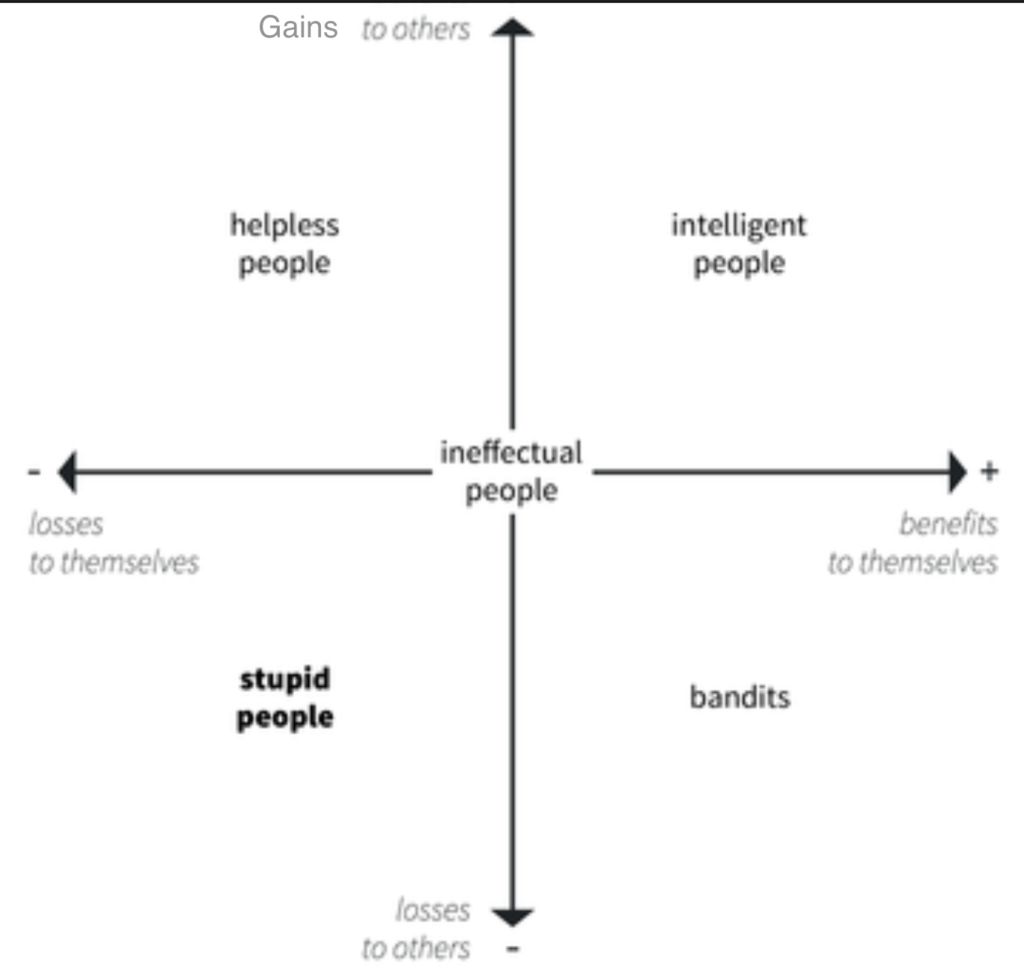
Maybe it’s my own confirmation bias kicking in, or I’m being blasted with stories of incredibly boneheaded behavior. But, it seems as of late, I keep hearing from my friend’s comments like, “What the hell were they thinking” or “This is just getting insane.” So, I decided to do a little reconnaissance research and see if I could connect some dots. And as usual, the universe provides answers when you ask the right questions.
Across my screen flows comments and analysis from economists, psychologists, and physicians, all pondering the genesis of stupid activity. Let me share their observations and then my own humble conclusions.
Carol Cipolla, an economist and former professor at UC-Berkeley, authored a tongue-in-cheek essay, “The Fundamental Laws of Human Stupidity.” Turns out he was more right than wrong. Among his laws are such prescient conclusions that:
- We always underestimate the number of stupid people out there
- Stupidity is independent of other characteristics of the person such as intellect, status, or wealth
- Stupid people cause losses to others (or a group) while not gaining anything or even losing to themselves
- Dealing with stupid people are always costly mistakes for the non-stupid
- Stupid people are the most dangerous in society
He went further to offer a way to categorize people’s behavior relative to the gains/losses incurred to both themselves and others.

I’ve found this diagram very helpful in figuring out who is doing what to whom and the impact of that behavior. Unfortunately, the lower-left quadrant seems to be filling up.
There you have it, the economic explanation of stupid behavior. For example, in the context of our ongoing public health pandemic, some consciously refuse to be vaccinated. This increases their own risk of contracting the virus (a loss to them) while also increasing the risk to the larger societal group – a potential loss to others). In the context of Cipolla’s laws, this would place them in the ‘stupid’ category.
Moving on to a more psychological viewpoint, we have Dr. Daniel Kahneman, a Nobel Laureate, opines why people in uncertain situations often make ‘foolish decisions.’ He’s kind. From Kahneman’s research, it seems that people don’t behave in logical, rational ways when under stress.
We use mental shortcuts, have unconscious biases, and easily default to erroneous frames of reference. Simply put, we just ‘do’ we don’t think. Further (and in keeping with Cipolla’s 2nd Law of Stupidity) and one’s degree of intelligence seems to make things worse. He states that our root causes of irrationality are unconscious. That would explain why it is soo difficult to get others to understand their stupid behavior. And it follows that it is even more challenging for one to recognize and understand their own stupid behavior.
This is getting murky, so I turn to a physician and New Age guru Deepak Chopra. Maybe he can offer some wisdom that escapes the rational, analytic Western mind. While he doesn’t use the specific term of ‘stupidness,’ he does highlight four areas where humans seem to be making less than optimal decisions.
“The four most urgent problems on humanity’s plate are overpopulation,
pandemic disease, refugeeism, and climate change.” A Reality Reset is Coming
My reference to vaccination behavior would fall into his category of pandemic disease. We can indeed find examples in the classes, but brevity prohibits a more profound discussion here.
His conclusion is that we are not very self-aware. We operate under a set of false assumptions about reality. We are stuck in a false state of consciousness. He says it better than I can.
“No worldview explains everything, so humans prioritize the things that need explaining most urgently. God was the most urgent issue in an age of faith. Science and technology are the most urgent things in an age of materialism. When something new becomes more urgent, worldviews change.”
We are caught at the cusp of a change in worldview. The reset is emerging.
So, what do I conclude from all of this? Yes, we Earthlings are caught up in a rash of stupid behaviors. Because we are not rational economic actors, we unconsciously act on erroneous mental models. We are not very self-aware; we are not very mindful.
Then, how do we stupidproof our future? Maybe if we took time to be present and carefully thought about our impact on ourselves and others before acting or taking an unmovable attitude, we could start. Maybe if we learned how to take the emotions (and ego) out of our decision-making process, we could start. Maybe if we stopped worshiping at the altar of technology and materialism, we could start.
Maybe we should just wake up, as Gurdjieff would say.
“They would not do this, of course, if they were to wake up. Everything
that takes place is owing to this sleep.” G.I. Gurdjieff


Leave A Comment
You must be logged in to post a comment.